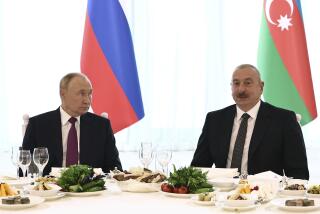Violence Flares Anew Along Armenia-Azerbaijan Border : Soviet Union: Three reported killed in one clash after Gorbachev lifts state of emergency, pulls out troops.
- Share via
MOSCOW — Violence is reported flaring again along the border between the southern Soviet republics of Armenia and Azerbaijan after President Mikhail S. Gorbachev lifted the state of emergency there and withdrew the central government’s peacekeeping troops.
Three people were killed and 10 wounded in one weekend clash as Azerbaijani special forces moved into the Shaumyan district, adjacent to the embattled Armenia enclave of Nagorno-Karabakh within Azerbaijan, after the Soviet troops pulled out, according to Armenian officials in Yerevan.
Gun battles broke out near several other Armenian villages as well, the officials said, and on Sunday evening the whole border region was described as tense with Armenians fearing that they will be forced out of three of their remaining villages in the Shaumyan district.
Levon Ter-Petrosyan, the Armenian president, who summoned an emergency weekend session of the Armenian Parliament to discuss the new crisis, and Armenian members of the Supreme Soviet, the national legislature, petitioned Gorbachev to intervene and prevent the further deportation of Armenians living in Azerbaijan.
“It appears that the Armenians of the Shaumyan region will share the fate of the Armenians of Sumgait,” the deputies wrote. They referred to the February, 1988, campaign against Armenians living in Azerbaijan’s second city, Sumgait, when 31 were killed by mobs.
“We ask you to summon an urgent session of the national security council and take measures to protect the lives of the region’s residents and stop the forceful deportation of the Armenian population.”
But Abulfaz Aliyev, a spokesman for the Azeri Popular Front in Baku, the Azerbaijani capital, denied that there was any move to force out the Armenians living in the area and blamed Armenians for the tension.
“This war goes on every day,” Aliyev said by telephone. The Armenians “do not want to calm down. It would be wrong to say that there is a lot of tension today while there was none yesterday.”
The independent Soviet news agency Postfactum quoted Azerbaijani officials as explaining that their commandos were carrying out passport checks and had confiscated weapons and a radio transmitter.
Razmit Khumaryan, head of the Armenian National Movement’s information center in Yerevan, said that about 300 Azerbaijani commandos attacked three villages about 6 a.m. Saturday, almost immediately after the pre-dawn withdrawal of the Soviet troops. The Armenian villagers fought back, and gun battles continued into the afternoon, he said.
The heaviest fighting was reported around the village of Erkejan, where Armenians are said to have forced the Azerbaijanis to retreat, killing two and suffering one dead themselves. At Erkejan, the villagers manage to surround 34 of the Azerbaijani commandos, according to Khumaryan, but they were rescued when Soviet troops returned to the region to halt the clashes.
Ter-Petrosyan, addressing the Armenian legislature on Saturday, accused Gorbachev of lifting the 18-month state of emergency and withdrawing Soviet troops to ensure Azerbaijan’s approval for a new Union Treaty that he wants in order to halt the country’s breakup.
Ter-Petrosyan also said that Gorbachev might be trying to force Armenia to sign the treaty, forsaking any dreams of independence, by demonstrating to it that without protection from Moscow, Armenians will be at the mercy of their neighbors.
He told the legislators that 75 Armenians were killed during clashes in April and May, including 35 in Armenia itself, that 120 were wounded and that 413 were taken prisoner, including 100 who are still held. He said Azerbaijani authorities have deported more than 5,000 Armenians from 20 border villages.
More than 800 people have been killed, most of them around the enclave of Nagorno-Karabakh, since the conflict first erupted in early 1988.
In lifting the state of emergency in two districts, which had been under virtual martial law since January, 1990, Gorbachev said last week that he believed the situation was now stable, but he warned Azerbaijan that it must honor commitments given on the security of its Armenian residents.
Gorbachev said in his decree that President Ayaz Mutalibov of Azerbaijan had pledged to him that “all measures will be taken for the security of the people living in the zone of the Karabakh conflict and for preventing the uprooting of the local people without cause.”
A state of emergency remains in effect in Nagorno-Karabakh.
More to Read
Sign up for Essential California
The most important California stories and recommendations in your inbox every morning.
You may occasionally receive promotional content from the Los Angeles Times.













